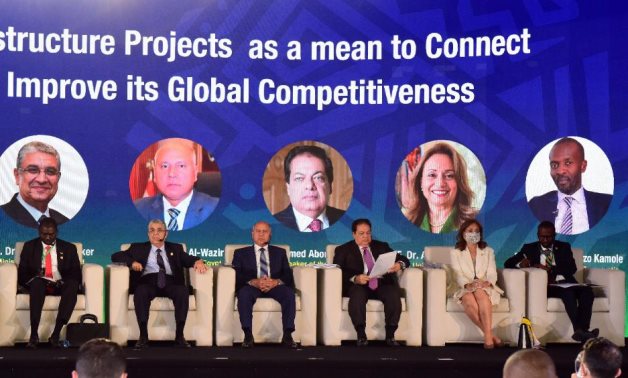
Panel in IPAs Africa Forum 1 on June 11, 2021. Press Photo
CAIRO - 11 June 2021: Minister of Transport Kamel al-Wazir explained Friday in IPAs Africa Forum 1 that Egyptian railway lines have to reach Saloum in the west so it would extend to Libya and, Abou Simbel in the south so it would extend to Sudan’s Wadi Halfa.
 Egyptian Minister of Transport Kamel al-Wazir in IPAs Africa Forum 1
Egyptian Minister of Transport Kamel al-Wazir in IPAs Africa Forum 1
France’s Allison as well as a number of Egyptian companies will execute the Egypt-Sudan rail line project stretching over 283 kilometers, including 150 kilometers in Egypt.
It will later reach Abou Hamd, then Khartoum. The project will be financed through a loan.
The trains will be designed to operate on Sudan’s railways whose width is one meter compared to Egypt’s whose width is 140 centimeters.
Speaking of urban ports, Egypt developed those in the south that are Arkin, Qansal, and Ras Hadroba. That’s in addition to Saloum in the west.
Egypt paved roads stretching over 1,155 kilometers locally so they will be part of a road stretching over 10,228 kilometers extending to Cape Town.
Minister Wazir added that there is also a project to establish a road between Egypt and Chad.
The minister argued that roads attract investments in the commercial and real estate sectors. He pointed out that in seven years, Egypt’s ranking of road quality jumped from the 128th place to the 28th place.
Deputy Speaker of the House of Egypt’s Representatives Mohamed Abou El Enein suggested that launching initiatives designed to exploit each type of its resources for it is very rich in minerals and solar energy given that sunny daylight remains for 14 hours a day on average in Africa.
 Deputy Speaker of the House of Egypt’s Representatives Mohamed Abou El Enein
Deputy Speaker of the House of Egypt’s Representatives Mohamed Abou El Enein
“We want more specialized industrial zones, which will attract small investors and boost feeding industries,” Abou El Enein said.
AU Commissioner for Infrastructure and Energy Amani Abou-Zeid showcased that studies indicate that risks of investment in Africa are lower than those in many areas in the world or at least the same as most of areas.
 AU Commissioner for Infrastructure and Energy Amani Abou-Zeid
AU Commissioner for Infrastructure and Energy Amani Abou-Zeid
In a different context, Abou Zeid noted that the digitalization of all sectors has become a must to achieve development in Africa because of COVID-19.
Another benefit of the pandemic is that it elicited the best of Africa whose countries were helping each other during the crisis, the AU commissioner highlighted.
In order to establish intra-African infrastructure and promote intra-continental trade, the local development gaps of Africa has to be mended.
Given that electricity linkage is among intra-continental infrastructure projects in Africa and given that Egypt did it with Sudan, Minister of Planning and Economic Development Hala El-Said pointed out that in 2016-2017 many Egyptians would experience electricity outage for half the day, which no longer the case.
The minister shed light on the huge infrastructure revamp Egypt got over the past seven years. That cost LE1.7 trillion which is equivalent to more than $100 billion.
Said highlighted that the second phase of the economic reform program is about maintaining the sustainability of growth and development, including the creation of decent jobs.
As the private sector’s participation is key in development, the minister showcases that the Sovereign Fund of Egypt is also working on expanding the share of the private sector in state-owned economic establishments.
Simultaneously, Minister of International Cooperation Rania al-Mashat pointed out that international funding is not just directed to state plans but also to the private sector empowerment.
Although getting funding in 2020 was so hard, Egypt’s good record qualified it to receive $9.8 billion in financing from development partners, Mashat underscored.
The minister equally showcased that certain Egyptian projects received international awards such as Mahsama wastewater treatment plant and others in the transport sector.



Comments
Leave a Comment